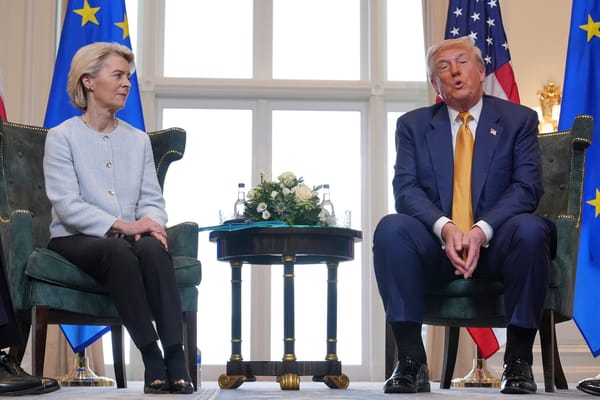Though the details of the recent trade deal between the United States and the European Union continue to emerge, it is clear that Donald Trump has secured an enormous diplomatic victory. Washington has extracted important concessions from Brussels, and this recent win in the global trade war will provide significant relief for Trump on other fronts.
Under the terms of the agreement, the European Union has accepted a 15 percent base-line tariff on most EU goods—including semiconductors, pharmaceuticals, and cars—and the 50 percent tariffs on EU steel and aluminium imports to the United States remain in place. In return, the United States has agreed to hold off on further tariffs on imports such as aircraft components, chemicals, and critical raw materials. In addition, the European Union committed to buy $750 billion in liquified natural gas (LNG) from the United States as well as oil and nuclear fuels to replace the gas imports lost to sanctions on Russia. These details should be considered alongside other recent concessions: NATO member-states, a group that has significant overlap with the European Union, have also agreed to buy more US weapons to ship to Ukraine, thereby allowing Trump to arm Ukraine while off-loading the costs onto European allies.
“Trump’s tariffs … threaten to undermine the fundamental justification for the European Union.”
Trump’s tariffs have not resulted in the economic cataclysm that many economists predicted. Nor have they isolated the United States while empowering Europe, as some hoped. On the contrary, they now threaten to undermine the fundamental justification for the European Union.
Despite all the utopian dreams of European federalists, the strongest case for the European Union was never that it would become a superpower on the level of the United States or China, but that it would be a wealthy, stable trading bloc that could turn its enormous economic weight into market power. While Brussels knew it could never wield the strategic influence or military might of Washington, its bureaucrats and lawyers prided themselves on their soft power, which allowed them to influence trade law and global regulations. In contrast to the Americans’ nation-building crusades in the Middle East, the European Union expanded its borders in the 2000s by absorbing and reforming the states of the defunct Eastern bloc. This was achieved without conquest or brute force, but through a slow process of institutional alignment, assimilation, capacity-building and legal reforms. Theorists of EU hegemony such as Colombia law professor Anu Bradford even dreamed of a “regulatory superpower”—a trading bloc that could impose its trading standards on the rest of the world. The European Union may not have a defense ministry, but its officials could pride themselves on the world-beating expertise of their trade lawyers, negotiating teams, and regulatory experts.
The Trump trade deal shatters this image. Not only is Europe militarizing in order to support the NATO proxy war in Ukraine, it is substituting its dependence on Russian gas for more expensive American LNG, while at the same time supporting the US military-industrial complex through its collective purchases. The smug belief of EU trade commissioner Maroš Šefčovič that he would be able to wrap Trump up in red tape has been rudely torn down. More to the point, how can the European Union justify its existence if it cannot even deliver on its essential purpose: strengthening the economic position of its member-states by unifying them into a trading bloc? The trade deal is a personal humiliation for EU Commission president Ursula von der Leyen, not least because she has centralized so much power in her own hands, making it harder to avoid responsibility for collective outcomes such as this.
Looking to the future, the trade deal will not only gnaw away at the European Union’s industrial competitiveness with high energy costs and military dependence on US arms factories, it will eat away at the rationale for the European Union itself. Brexit Britain, supposedly destined for economic oblivion once it left the bloc in 2020, only endures a 10 percent baseline tariff in its trade with the United States, while also having the flexibility to sign large new trade deals with emerging economies such as India. As the burden of the US tariffs, LNG and compulsory arms purchases accumulates, member-states will increasingly ask themselves whether the relative advantage of remaining in the EU is outweighed by the benefits of leaving.
Trump’s trade victory over the European Union is further evidence that we are entering a new international order. It is all the more significant for being a strategic victory won in peace not war, on the very terrain that the European Union prided itself on having mastered—that of peaceful expansion through trade.
